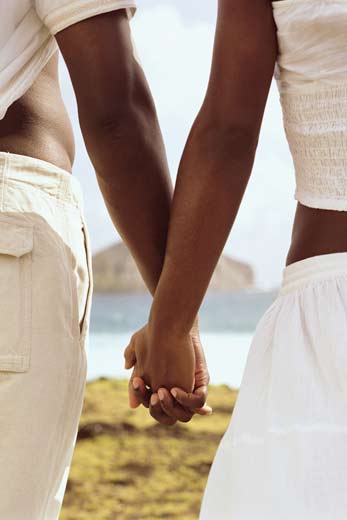
As a child I learned what a family should look like from church fans — those toast-shaped pieces of card stock stapled to tongue depressors — found in almost every Black church. To pass the time during sermons I would stare at the images on those fans. Staring back at me was a perfect picture of a husband, wife and two children, all dressed for Sunday services. The composition of the family was always the same, and the illustration conveyed a message of marital stability and ultimate respectability. I even had a name for that model family: the Fanstons.
If this is the picture of domestic success, then I have proudly failed. Not to say that I oppose the idea of the mustached Fan Man and his brood, but I have taken a different path to becoming happily settled as a family man. You see, I’m not married to my girlfriend (or partner or sweetie or boo). Friends and strangers often ask me when we’re going to “make it official.” I guess our personal agreement to live as life partners and raise our child together is not enough for them. In the eyes of society and the law, marriage is the only way to live and love.
Think about the many forms you have filled out, from employment applications to medical information sheets at the doctor’s office: There are only boxes to mark if you’re married, single or divorced. There aren’t any boxes for dating, cohabitating or roommating. Everything unmarried just means “single.”
There isn’t even a friendly word in English that defines people living together without being married. I could use cohabitant, but it sounds too cold and legal to accurately describe the life my partner and I have built together. We are committed to each other for the long term. We clean our house, go to work, take care of our babies (pet included) and have the same interminable relationship conversations as any husband and wife would have.
Supposedly my child is illegitimate, despite his hyphenated surname, the Photoshopped “This is my new baby!” birth announcement and our utter dedication to diaper changes (89,273 and counting). In our lives “out of wedlock,” my girlfriend and I don’t have the piece of paper that makes the world recognize our relationship as stable or permanent. But so what? Being unmarried doesn’t mean being alone. Many people, including Black Americans, choose other ways to live. The reasons vary: Some may not believe in the institution; others may not think they have enough money. Perhaps their peers aren’t marrying and they’re following suit. Or they’re avoiding marriage to retain some legal benefits. I want living together to be taken seriously, and I want ways other than a wedding to “seal the deal.” This is important for African-Americans, who are more likely to form families outside of marriage. The Pew Research Center recently reported that only 51 percent of people in the United States are married. That’s the lowest recorded rate in American history. For Black women, as we are constantly reminded, the percentage is even lower.
“We should celebrate the families that exist before us rather than reprimand people for ‘shacking up.'”The media tell us that the Black family is in crisis because of single parents, irresponsible fathers and a declining interest in marriage. Does this include my family? It could. Technically my partner and I are single, even though we have shared a life together for years. Perhaps we are both irresponsible and uninterested because we found ways other than marriage to express love and commitment. But this crisis of the family (to which we apparently contribute) says more about a classification than it does about our actual lives. Focusing on the marital status of Black people misses the boat. Attention should be placed on positive relationships, healthy communication and mutual support rather than a symbolic change of status. “The crisis” says nothing about actual relationships and practical responsibility. We should celebrate the families that exist before us—in all their diversity—rather than reprimand people for “shacking up.”
The hope for a return to the traditional family reminds me of those paper fans from my childhood church. The pictures were idealized, yes, but they delivered a strong message: Fan Husbands and Fan Wives were inherently valued because they were married and spiritual.
Does this mean that the souls of Black folks will be saved through church-fan magic? That Black people will be “complete” if they marry? Many books claim that marriage improves our lives and makes us better people. We’d all like to have a Tinker Bell wave her wand and give us more money, make us happier and make our children smarter, but it’s not going to come automatically from jumping brooms and tossing garters.
It is not the classification that makes people behave differently, and it shouldn’t be a classification that makes others take our families seriously. Marriage will not bring fathers home any more than fatherhood brings about marriage. Even without children, people in a marriage do not receive an automatic membership card to the good life. Unmarried people have fruitful relationships and strong families, but society always wants something more from us.
Pining for a marital uniformity of families overlooks the fulfilling relationships and rich love that characterize our lives. Unmarried people can have full lives without other people wishing they would take it further. We want our families to feel empowered, included and valued. I love my cohabiting home life for what it is now and what it promises to be in the future. We are “final” where we are. We don’t need a license from the state to prove our commitment or to gain respect. We have each other, and that is enough.
“Not Married, Not Single” appeared in the November issue of ESSENCE Magazine, on newsstands now!
